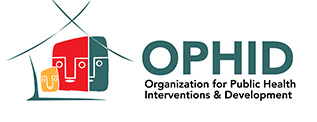The Organization for Public Health Interventions and Development (OPHID) started operations in Zimbabwe as an NGO in 2001 under a different name, changed its status to become an independent local organization in 2007, and has grown to be one of the main local stakeholders in the field of HIV/AIDS.
Twenty years ago, HIV was greatly impacting Zimbabwe. Apart from a few clients registered in clinical trials for antiretroviral therapy (ART), no clients were on lifelong ART. In 2001, 130,000 AIDS-related deaths were recorded in Zimbabwe. Over the years Zimbabwe has seen an estimated 75% decline in AIDS-related deaths among adults and children from a peak of 130,000 deaths in 2001 to 20,000 deaths in 2021.

HIV Service Quality Officer at a facility in Beitbridge supporting clients with ART refills
Through the FACE-HIV program between 2012 and 2020, OPHID and its consortium partners worked across 670 health facilities. In these facilities, work within communities was supported through Health Centre Committees, community structures established to provide governance of clinical services. The FACE-HIV program developed SOPs, data use guides, and other tools to aid HCC members’ understanding of the HIV program, leading to stronger buy-in and improved health-seeking habits for HIV services from communities.
With expanded access to ART there has been a significant drop in HIV-related mortality. The advent of ART, which is recommended for all people living with HIV, has facilitated prolonged survival and reduced risk of transmitting HIV.
Some of our key achievements include:
-
With funding from PEPFAR through USAID, OPHID supported the Zimbabwe Ministry of Health in 2013 to adopt and scale up a new WHO guideline which recommended the provision of lifelong ART to all women living with HIV who were pregnant and breastfeeding, and immediate initiation of ART for all children living with HIV less than five years of age. By the end of 2014, 1,560 healthcare facilities across all ten provinces of Zimbabwe were offering ART in antenatal services, bringing life-saving treatment closer to mothers and their infants.
-
An OPHID program supported efforts to increase the percentage of children and adolescents living with HIV who are enrolled on ART; the program prioritized the provision of integrated HIV testing, care, and treatment services in 348 health facilities across 22 high HIV burden districts. From October 2015 to September 2016, 365 infants, 1,548 children, 3314 adolescents and 4,193 young women who tested positive for HIV accessed lifelong ART.
-
With PEPFAR/USAID support, OPHID became the first organization in Zimbabwe to integrate cervical cancer screening in routine HIV care and treatment services.
OPHID is currently implementing a five-year project to contribute to the achievement and sustainability of HIV epidemic control in Zimbabwe; the project will support a package of interventions to strengthen health systems, specifically the bridge between facilities and community structures.

Bringing treatment to communities: women queue up for outreach services to collect their antiretroviral therapy and go through cervical cancer screenings in Chiredzi
20 years ago, HIV was greatly impacting Zimbabwe. Apart from a few clients registered in clinical trials for antiretroviral therapy (ART), no clients were on lifelong ART. In 2001,130,000 AIDS-related deaths were recorded in Zimbabwe. Over the years Zimbabwe has seen an estimated 75% decline in AIDS-related deaths among adults and children from a peak of 130,000 deaths in 2001 to 20,000 deaths in 2021. With PEPFAR support, Zimbabwe has been able to roll out treatment to cover more PLHIV. Under the TASQC program, OPHID supports 341,469 clients with life-saving treatment across four provinces in Zimbabwe.
With PEPFAR support, Zimbabwe has been able to roll out treatment to cover more people living with HIV. Under the current program, OPHID supports 341,469 clients with life-saving treatment across four provinces in Zimbabwe.

Clients wait for services during a community outreach event in Bulilima

